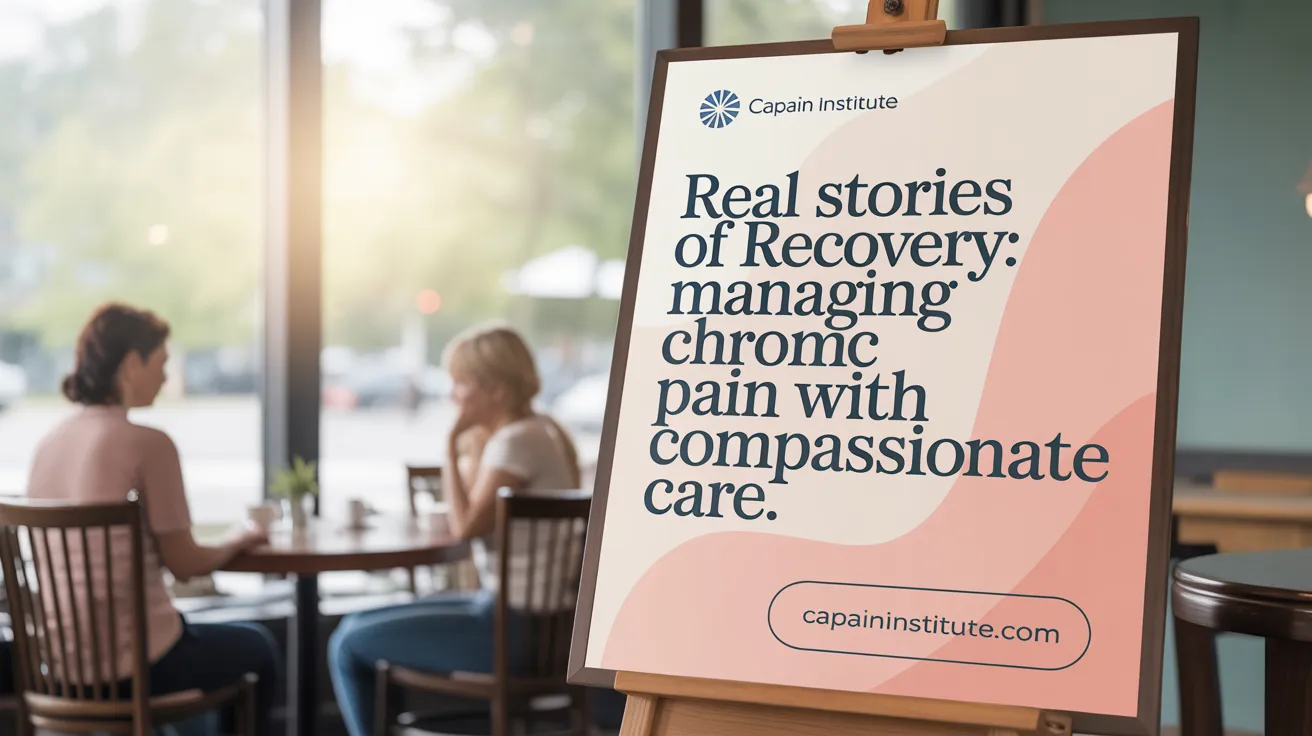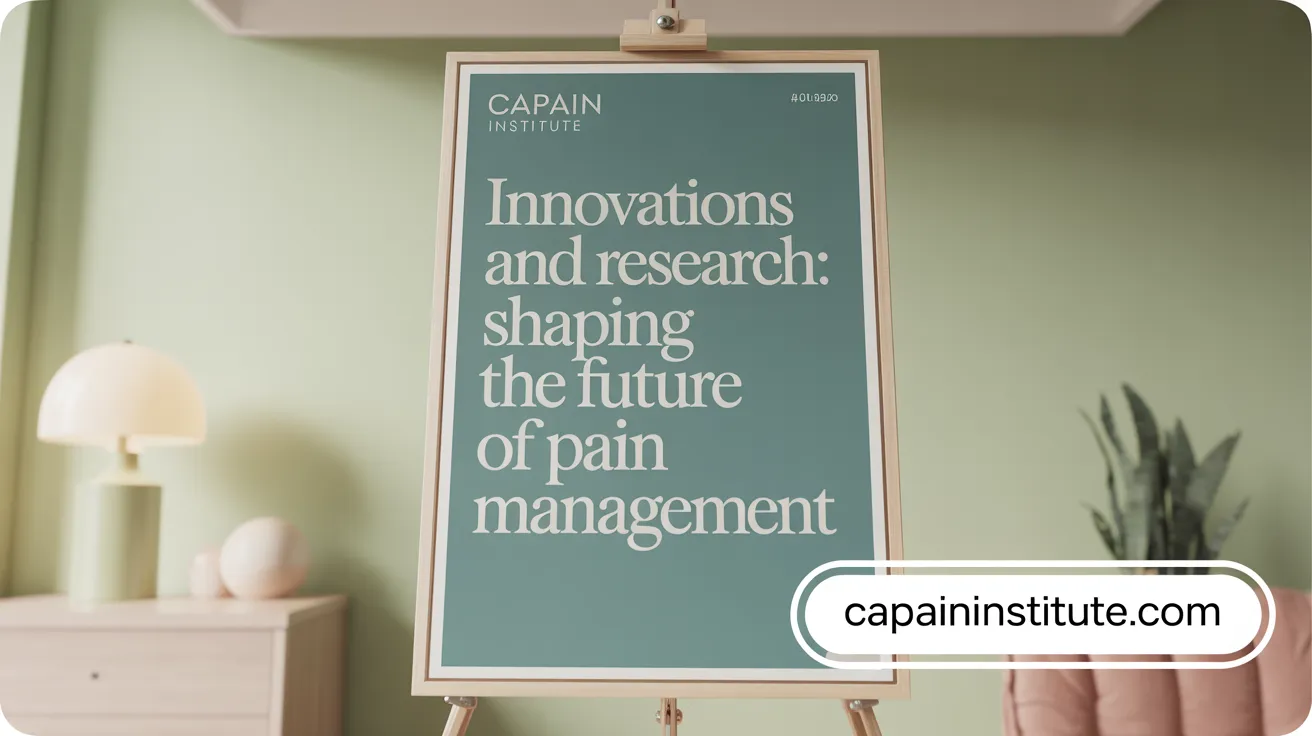The Journey Begins: Understanding Chronic Pain and Its Impact
Defining Chronic Pain and Its Effects
Chronic pain is more than just a prolonged sensation of discomfort; it is recognized as a disease itself, affecting millions of individuals worldwide. It persists beyond the typical healing time, often lasting months to years, and can profoundly impact daily life, limiting activities and diminishing quality of life.
Conditions Addressed at Specialized Clinics
Specialized pain management clinics, like those described in patient stories, focus on complex conditions such as Complex Regional Pain Syndrome (CRPS), chronic knee and spinal pain, and pain associated with inoperable tumors. These clinics provide comprehensive care through multidisciplinary approaches, aiming not only to reduce pain but also to restore function and improve overall well-being.
Comprehensive Care at the California Pain Institute: Who We Are and What We Treat
What types of chronic pain conditions does the California Pain Institute diagnose and treat?
The California Pain Institute specializes in diagnosing and treating an extensive range of chronic pain conditions. These include neuropathic pain, back pain, arthritis, fibromyalgia, headaches, joint pain, and cancer-related pain. Their approach ensures that patients receive tailored care designed to address their specific pain challenges.
How do multidisciplinary and personalized treatment strategies work?
The institute employs a multidisciplinary model that integrates medications, physical therapy, psychological support, interventional procedures, and alternative therapies for pain (tai chi, yoga). This combination allows for a personalized treatment plan that meets each patient’s unique needs. Coordination among pain specialists, therapists, and mental health professionals provides comprehensive support to improve function and quality of life. This mirrors multidisciplinary care in chronic pain programs and psychological support for pain management.
What advanced therapies and lifestyle approaches are introduced?
Advanced treatments available include spinal cord stimulation, nerve blocks, and radiofrequency ablation, which are utilized for appropriate candidates to manage persistent pain effectively. Alongside these interventions, the clinic emphasizes lifestyle modifications such as regular exercise, stress management, and sleep hygiene. These holistic strategies empower patients to maintain pain control and enhance overall well-being. These approaches are consistent with spinal cord stimulator implantation, peripheral nerve blocks therapy, and alternative therapies for pain (tai chi, yoga).
Led by experienced clinicians, the California Pain Institute delivers compassionate, evidence-based care to the Los Angeles community, mirroring successful comprehensive programs seen in centers like Regions Hospital and HealthPartners Clinics and Johns Hopkins.
Leadership and Expertise: The Driving Force Behind Effective Pain Management
Who leads the California Pain Institute and what is their expertise?
The California Pain Institute is led by Dr. Zach Cohen, a highly qualified and double board-certified physician in Anesthesiology and Chronic Pain. He completed specialized fellowship training at UC San Diego, equipping him with extensive expertise in diagnosing and managing complex chronic pain conditions such as fibromyalgia.
Dr. Cohen’s leadership ensures that the institute provides advanced, non-surgical pain treatments including medication management, interventional procedures, and holistic therapies like cognitive behavioral therapy, mindfulness, and biofeedback. This comprehensive approach not only targets pain relief but also supports overall well-being.
Team approach and collaboration with other specialists
Under Dr. Cohen’s direction, the California Pain Institute operates with a multidisciplinary team model. This means close collaboration among primary care doctors, rheumatologists, neurologists, mental health professionals, and dietitians. Such cooperation helps tailor treatment plans to each patient’s unique needs, addressing physical symptoms as well as emotional and lifestyle factors influencing pain.
With multiple convenient locations across Los Angeles and surrounding areas, the institute provides expert pain management services designed to improve quality of life through compassionate and specialized care. They also incorporate alternative therapies for pain (tai chi, yoga) and utilize innovative treatments such as spinal cord stimulation to enhance patient outcomes.
Exploring Treatment Options: How the California Pain Institute Manages Chronic Pain

What are the common treatment options available at the California Pain Institute for managing chronic pain?
The California Pain Institute services offers a comprehensive range of treatments designed to manage chronic pain effectively through a personalized, multidisciplinary approach. Medication management is tailored individually, ensuring patients receive the most suitable pharmaceutical options for their specific condition.
Interventional procedures form a core part of the Institute's offerings. These include:
- Nerve blocks and epidural steroid injections, which help reduce inflammation and interrupt pain signals.
- Spinal cord stimulation and peripheral nerve stimulation to modulate nerve activity and decrease pain perception.
- Radiofrequency ablation and sacroiliac joint injections targeting specific sources of pain.
- Kyphoplasty for certain spinal fractures.
In addition to these, innovative therapies are integrated into treatment plans. Regenerative medicine techniques, including platelet-rich plasma (PRP) therapy, support tissue healing, while ketamine infusions serve as an option for patients with refractory pain or neuropathic symptoms.
Physical therapies such as aquatic therapy and traditional physical therapy programs enhance mobility and functional ability. Psychological interventions, including cognitive-behavioral therapy and biofeedback, contribute to managing the emotional and psychological components of chronic pain.
Alternative therapies for pain (tai chi, yoga) are also part of the holistic approach to managing chronic pain.
This coordinated care ensures that patients receive individualized treatment plans that address both the physical and psychological aspects of pain, improving overall quality of life and daily function.
Tailoring Care: The Personalized Approach to Chronic Pain Management
How treatment plans are individualized
At the California Pain Institute, each chronic pain patient receives a tailored treatment plan that reflects their unique medical history, pain severity, and personal goals. This customization considers diverse therapies ranging from physical rehabilitation to advanced neuromodulation techniques like spinal cord stimulation.
Role of multidisciplinary team and patient collaboration
A multidisciplinary team of specialists—including physicians, physical therapists, psychologists, and pain specialists—works collaboratively with patients. This partnership ensures comprehensive management that addresses physical symptoms and psychological well-being, fostering patient empowerment and active participation in recovery. This approach aligns with the multidisciplinary care in chronic pain and psychological support for pain management emphasized in expert pain management strategies.
Inclusion of lifestyle changes and supportive therapies
The care approach incorporates lifestyle modifications and supportive therapies such as yoga, tai chi, cognitive-behavioral therapy, nutrition guidance, and sleep hygiene practices. These elements complement medical treatments, helping improve function and quality of life, consistent with the use of alternative therapies for pain (tai chi, yoga) as part of compassionate care.
Ongoing monitoring and research efforts
Regular monitoring enables timely adjustments to medications and interventional procedures, particularly for patients on opioids, ensuring both safety and effectiveness. The institute's commitment to research, including pharmacogenomic studies, underlines its focus on refining personalized medicine to achieve optimal outcomes for chronic pain sufferers, in line with ongoing pain treatment options and comprehensive pain management services.
First Steps in Care: What Patients Can Expect During Their Initial Visit

What should a patient expect during their first visit to the California Pain Institute?
During your first visit to the California Pain Institute, you will undergo a thorough and compassionate evaluation designed to understand the full scope of your pain. This begins with a comprehensive review of your medical history, including any previous treatments or diagnostic tests you have had. You'll share details about your current symptoms, their intensity, and how they affect your daily life.
The physician will perform a physical examination to assess the areas where you experience pain, helping pinpoint potential causes and contributing factors. This hands-on assessment complements the detailed history and ensures no aspect of your condition is overlooked.
Following the evaluation, the physician will work collaboratively with you to create a personalized pain management plan. This tailored approach integrates evidence-based treatments that may include physical therapy, injections, medication management, or advanced interventions like spinal cord stimulation, depending on your needs.
Patient education is a crucial part of the initial visit. You’ll receive information about your pain condition and the variety of treatment options available, empowering you to make informed decisions about your care. The team encourages questions to ensure you fully understand the path ahead and feel supported throughout your recovery journey.
This comprehensive approach reflects best practices in pain management, as seen in specialized programs across the country, and aims to restore your quality of life with expert, multidisciplinary care.
Real Patient Voices: Overcoming Chronic Pain Through Integrated Care

What was Colleen Crownhart’s journey with chronic knee and spinal pain?
Colleen Crownhart, from Los Angeles, faced years of severe chronic pain affecting her knee and spine. Her experience highlights how persistent pain can severely impact daily life and the importance of pursuing comprehensive pain management services.
What role did multidisciplinary treatment play in her recovery?
Colleen’s recovery involved various advanced treatment modalities, emphasizing a multidisciplinary care in chronic pain. This included physical therapy to improve mobility, pain-relieving injections targeting specific nerve areas, and, notably, the implantation of a spinal cord stimulator. This device works by sending electrical impulses that disrupt pain signals before they reach the brain, reducing her chronic discomfort.
How was compassionate care and psychological support important?
Beyond physical treatments, Colleen’s journey was supported by compassionate medical care for chronic pain from her medical team, which included psychological support. Managing chronic pain isn’t solely about physical symptoms; emotional and mental health care is vital. Colleen participated in a pain rehab program participation that integrated psychological counseling, helping her cope with pain-related stress and improving overall well-being.
How were complementary therapies used in her pain management?
In addition to conventional medical treatments, Colleen incorporated alternative therapies for pain (tai chi, yoga), alternative therapies for pain (tai chi, yoga), and alternative therapies for pain (tai chi, yoga) into her routine. These mind-body practices helped enhance her flexibility, balance, and relaxation, contributing positively to her pain management and quality of life.
Colleen’s experience illustrates how combining advanced medical interventions with psychological support and complementary therapies can offer a success story of recovery from chronic pain and a comprehensive path toward managing complex chronic pain conditions effectively.
Innovative Pediatric Pain Management: Tracie’s Story

What are the challenges of treating chronic pain in pediatric patients?
Chronic pain in children presents unique challenges, including the impact on growth, development, and daily functioning. Managing pain effectively while minimizing medication side effects is critical, especially given the risk of opioid dependency in chronic pain. Learn more about Tracie's opioid dependency story.
How are non-narcotic therapies used in pediatric pain management?
In Tracie’s case, Johns Hopkins All Children’s Hospital employed non-narcotic treatments such as peripheral nerve blocks, guided imagery, and music therapy. These approaches address pain through physical nerve targeting and engaging psychological and sensory pathways without the risks associated with opioids. See details on non-narcotic pain interventions.
What role does psychological support and multimodal therapy play?
Psychological interventions including psychotherapy and biofeedback complement physical therapies to enhance coping strategies and reduce the perception of pain. Multimodal care involving occupational and physical therapy supports functional improvement and overall well-being. More about psychological support in pain management.
How successful is opioid-free pain management in improving quality of life?
After a year of treatment, Tracie successfully discontinued opioid use and significantly improved her quality of life. She regained the ability to participate in normal activities, highlighting the effectiveness of integrated, non-narcotic pediatric pain management strategies. Read about opioid-free after one year and improved quality of life.
The Value of Multidisciplinary Programs: Lessons From Across the Country
What Are Specialized Chronic Pain Rehab Programs and Their Benefits?
Specialized chronic pain rehab programs are comprehensive treatment approaches designed to address not just the physical symptoms of pain, but also the emotional and psychological challenges patients face. These programs typically combine physical therapy, psychological support, injections, and alternative therapies for pain (tai chi, yoga) to provide holistic care. Learn more about Chronic pain management journey and Chronic Pain Rehab Program participation.
Examples of Integrated Care Models Outside California
A notable example is the Chronic Pain Rehab Program at the Courage Center in Golden Valley, Minnesota. Here, patients like Colleen Crownhart's comeback story have benefitted from multidisciplinary care including physical therapy, spinal cord stimulation, and psychological support. Similarly, the Johns Hopkins All Children’s Hospital in Florida offers a specialized chronic pain clinic that employs non-narcotic interventions such as peripheral nerve blocks therapy, guided imagery, and music therapy, focusing on helping patients regain function and reduce opioid reliance.
Alignment with Practices at the California Pain Institute
Though these examples are from outside California, they resonate strongly with the approach at the California Pain Institute in Los Angeles. The Institute emphasizes compassionate, high-quality care through expert pain management teams that integrate similar modalities—physical therapy, psychological counseling, and advanced medical treatments—to improve patient outcomes.
Psychological and Physical Therapy as Integral Components
Across these programs, psychological therapies play a critical role in managing the emotional impact of chronic pain. Techniques like guided imagery, biofeedback therapy, and counseling support patients in coping effectively. Physical therapies including exercises, alternative therapies for pain (tai chi, yoga) help restore mobility and reduce pain severity. This well-rounded treatment strategy is essential for long-term improvement and quality of life in chronic pain sufferers.
Looking Ahead: The Future of Chronic Pain Management at the California Pain Institute

Innovations in pain treatment
The California Pain Institute services is committed to integrating the latest advancements in pain management to offer patients cutting-edge care. Inspired by successful multimodal approaches seen elsewhere, such as the use of spinal cord stimulation and comprehensive rehab programs, the Institute continues to adopt and refine technologies and interventions that improve pain relief, function, and quality of life.
Commitment to research and patient-centered care
The Institute prioritizes ongoing research to better understand chronic pain's complex nature, recognizing pain as a disease in itself rather than merely a symptom. This dedication supports the development of personalized treatment plans combining physical, psychological, and alternative therapies for pain (tai chi, yoga) tailored to each patient's unique needs.
Expanding access and continuing education for providers and patients
Recognizing disparities in pain care access, particularly for specialized populations, the California Pain Institute strives to broaden the availability of expert services locally, including at Regions Hospital and HealthPartners Clinics. Additionally, it emphasizes educating both healthcare providers and patients about the evolving landscape of pain management to empower informed decisions and promote effective interventions.
Holistic and personalized approaches to improve outcomes
Emphasizing multidisciplinary care, the Institute incorporates physical therapy, psychological support, and alternative therapies for pain (tai chi, yoga) to address chronic pain comprehensively. This holistic strategy is designed to enhance long-term outcomes by targeting multiple factors that contribute to pain, fostering recovery and sustained wellbeing.
Together Towards Healing: Embracing Hope in Chronic Pain Management
Patient-Centered, Multidisciplinary Care
Chronic pain management is most effective when approached through a comprehensive, patient-centered model. Stories like Colleen Crownhart's, who benefited from a combination of physical therapy, spinal cord stimulation, and psychological support, illustrate the power of multidisciplinary treatment programs. These programs, offered by specialty centers such as the Chronic Pain Rehab Program at the Courage Center and Johns Hopkins All Children's Hospital, combine medical, physical, and emotional therapies to address all aspects of pain.
Encouragement to Pursue Expert Care
For those living with chronic pain, seeking care from expert pain management teams can be life-changing. Advanced treatments—ranging from nerve blocks and injections to alternative therapies like yoga, guided imagery, and music therapy—reflect the evolving medical landscape that aims to reduce dependence on opioids and improve function. Patients are encouraged to find compassionate care providers who prioritize their quality of life alongside pain relief.
Vision for the Future
The future of chronic pain management lies in continued advancements and fostering supportive communities. Expanding access to specialized clinics, integrating innovative treatments such as Botox therapy, and emphasizing psychological and physical rehabilitation promise broader relief for patients. Together, patients and providers move towards healing with hope, resilience, and a shared commitment to restoring normal daily living.
